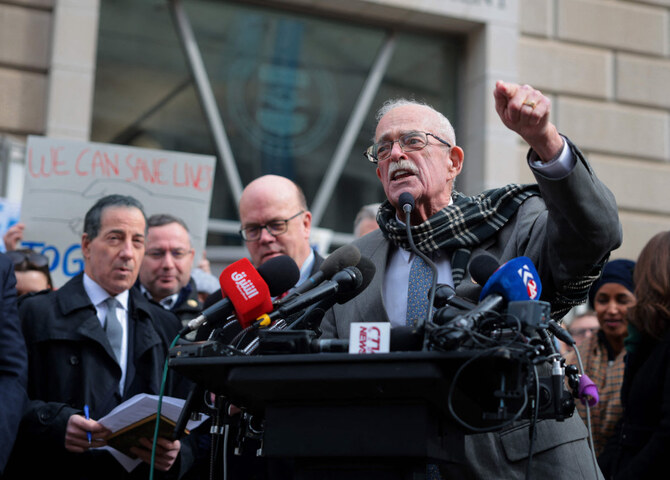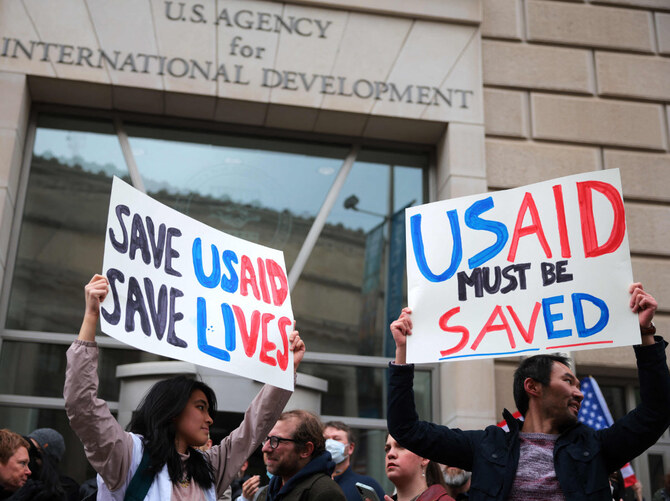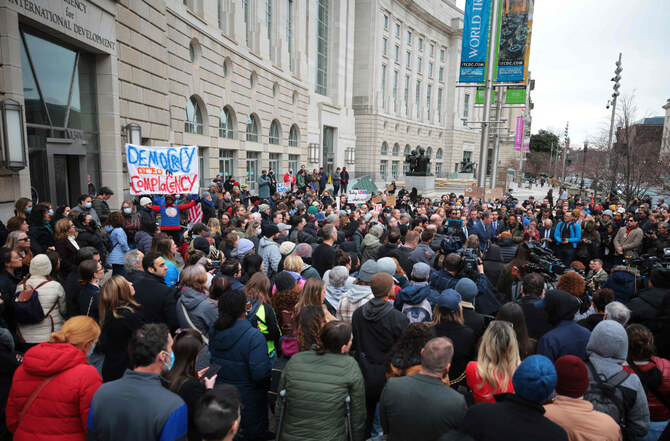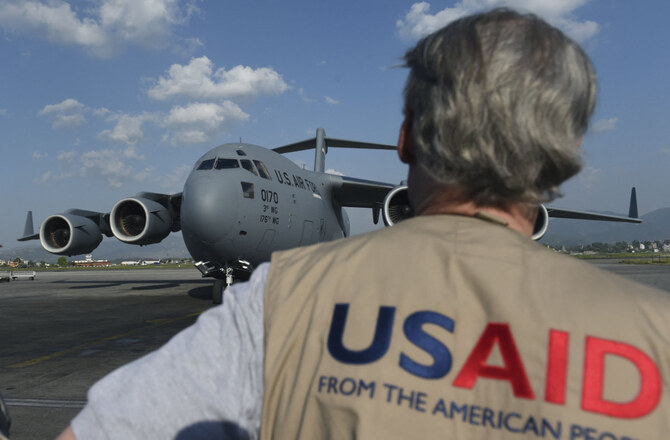WASHINGTON: The Trump administration and billionaire ally Elon Musk's move to eradicate the agency that provides crucial aid that funds education and fights starvation, epidemic and poverty overseas, has sparked a showdown with congressional Democrats, who blasted the effort as illegal and vowed a court fight.
In one of the most dramatic efforts to push back on President Donald Trump’s bid to slash and reshape the federal government, some Democrats sought Monday to enter the headquarters of the US Agency for International Development. They were blocked by officers from even broaching the lobby, and Secretary of State Marco Rubio said he was the acting administrator of the agency despite it being an independent body for six decades.
While Trump has spent the first three weeks of his new presidency making broad changes to the federal government, the fast-moving developments at USAID have emerged as a particularly controversial flashpoint with Democrats who argue it symbolizes the massive power Musk is wielding over Washington.
“Spent the weekend feeding USAID into the wood chipper,” Musk boasted on X.
In the space of a few weeks, in fact, much of the agency was dismantled — work and spending ordered stopped, leadership and staff gutted by furloughs, firings and disciplinary leaves, and the website taken offline. Lawmakers said the agency’s computer servers were carted away.
Trump told reporters Monday that shutting down USAID “should have been done a long time ago.” Asked whether he needs Congress to approve such a measure, the president said he did not think so.
Congressional Democrats, cheered by a few hundred supporters, vowed to act outside USAID headquarters, where federal officers and yellow tape blocked both employees and lawmakers from entering hours after Musk declared, “We’re shutting it down.”
“This is a constitutional crisis we are in today,” Democratic Sen. Chris Murphy said.
Added Maryland Democrat Jamie Raskin: “We don’t have a fourth branch of government called Elon Musk. And that’s going to become real clear.”
Showing the extraordinary power of Musk and his budget-slashing Department of Government Efficiency, thousands of USAID employees have been laid off and programs shut down around the world in the two weeks since Trump became president and imposed a sweeping freeze on foreign assistance.
The US is the world’s largest provider of humanitarian aid, and the moves have upended decades of US policy that put humanitarian, development and security assistance in the center of efforts to build alliances and counter adversaries such as China and Russia. Trump, Musk and Republicans in Congress have made the US foreign assistance program a special target, accusing it of waste and advancing liberal social programs.
The US spends less than 1 percent of its budget on foreign assistance, a smaller share overall than some other countries. Trump accused the Biden administration of fraud, without giving any evidence and only promising a report later on.
“They went totally crazy, what they were doing and the money they were giving to people that shouldn’t be getting it and to agencies and others that shouldn’t be getting it, it was a shame, so a tremendous fraud,” Trump told reporters in the Oval Office.
Democrats push back
Lawmakers sought to enter USAID offices in Washington, saying they wanted to speak to any staffers remaining about the dismantling of the agency. Department of Homeland Security officers and men identifying themselves as USAID employees blocked them. “Elon Musk’s not here,” one told the lawmakers.
Sen. Chris Van Hollen of Maryland called it an “illegal power grab” and said it was “a corrupt abuse of power that is going on.”
“It’s not only a gift to our adversaries, but trying to shut down the Agency for International Development by executive order is plain illegal,” he said.
Democrats said court challenges already were in the works and pledged to try to block approval of Trump’s State Department nominations until the shutdown is reversed. Democrats are in the minority in the House and Senate after last November’s elections, leaving them with reduced leverage.
Musk announced the closing of the agency early Monday as Rubio was out of the country on a trip to Central America.
Rubio told reporters in San Salvador that he was now the acting administrator of USAID but had delegated his authority to someone else. In a letter to lawmakers obtained by The Associated Press, Rubio designated Peter Marocco, a political appointee whose short stint at USAID in the first Trump administration generated unusual staff protests for pushing program cuts and investigations that ambassadors and other senior officials complained slowed work to a crawl.
In his remarks, Rubio stressed that some and perhaps many USAID programs would continue in the new configuration but that the switch was necessary because the agency had become unaccountable to the executive branch and Congress.
USAID’s work worldwide
Conservative Republicans have long sought to roll back USAID’s status as an independent agency, while Democrats traditionally back its status as an independent agency. President John F. Kennedy created USAID in 1961 at the height of the United States’ Cold War struggle with the Soviet Union, seeking a more efficient way to counter Soviet influence abroad through foreign assistance, and viewing the State Department as frustratingly bureaucratic at that.
The Trump freeze on foreign assistance and targeting of USAID, which oversees humanitarian, development and security programs in some 120 countries, has forced US and international companies to shut down tens of thousands of programs globally, leading to furloughs, layoffs and financial crises.
That includes an HIV/AIDS program started by Republican President George W. Bush credited with saving more than 20 million lives in Africa and elsewhere. Aid contractors spoke of millions of dollars in medication and other goods now stuck in port that they were forbidden to deliver.
Other programs that would shut down provided education to schoolgirls in Afghanistan under Taliban rule and monitored an Ebola outbreak spreading in Uganda. A USAID-supported crisis monitoring program, which was credited for helping prevent repeats of the 1980s famine in Uganda that killed up to 1.2 million people, has gone offline.
Other organizations have filed for bankruptcy or are facing it after being told USAID would not be paying its invoices for projects that have already been approved and implemented around the world.
Sen. Brian Schatz, D-Hawaii, said USAID is not just about saving other countries from starvation and disease. “There is a reason that USAID is an arm of American foreign policy, and it is because we understand that a stable world means a stable America,” he said.
Latest hit to USAID
USAID staffers said more than 600 additional employees had reported being locked out of the agency’s computer systems overnight. Those still in the system received emails saying that “at the direction of Agency leadership” the headquarters building “will be closed to Agency personnel on Monday, Feb. 3.” The agency’s website vanished Saturday without explanation.
Musk is leading an extraordinary civilian review of the federal government with Trump’s agreement. The day began with Musk announcing on a live session of X Spaces that he had spoken with Trump at length about the agency and “he agreed we should shut it down.”
“It became apparent that it’s not an apple with a worm it in,” Musk said in a live session on X Spaces early Monday. “What we have is just a ball of worms. You’ve got to basically get rid of the whole thing. It’s beyond repair.”
Since Trump took office, appointees brought in from his first term like Marocco placed more than 50 senior officials on leave for investigation without public explanation, gutting the agency’s leadership. When the agency’s personnel chief announced that the allegations against them were groundless and tried to reinstate them, he was placed on leave as well.
Over the weekend, the Trump administration placed two top security chiefs at USAID on leave after they refused to turn over classified material in restricted areas to Musk’s government-inspection teams, a current and a former US official said.
Musk’s DOGE earlier carried out a similar operation at the Treasury Department, gaining access to sensitive information including the Social Security and Medicare customer payment systems. The Washington Post reported that a senior Treasury official had resigned over Musk’s team accessing sensitive information.

















